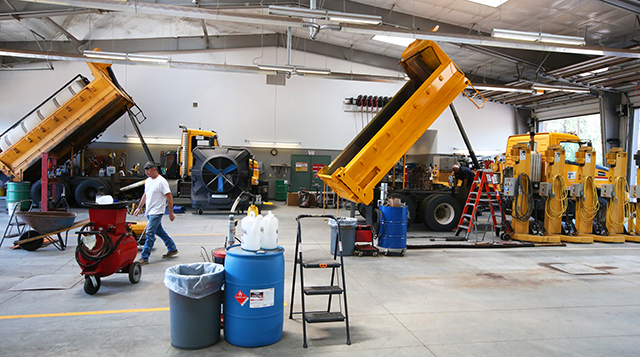Organ recipient’s family reflects on gift
Published 12:00 am Sunday, March 18, 2018
Eldon Hickey of Eugene never would have met his grandchildren, were it not for a young man who died in a Portland motorcycle crash in 1987.
Hickey’s family doesn’t know the motorcyclist’s name. But they’d sure like to thank his loved ones for his heart — the same one that beat within Hickey’s chest for more than 30 years until his death on March 9 at 82.
Trending
For the Hickeys, the young man’s organ donation represents the gift of life. They figure plenty of other recipients’ families feel a similar sense of gratitude.
“What we know is that when it happens, the (recipient’s) whole family gets their life back,” Hickey’s son, Tom Hickey, said Friday. “Most people might not realize that.”
Eldon Hickey, father to a daughter and three sons, is believed to have been one of the oldest and longest-surviving repeat heart transplant recipients in the United States.
The former federal government economist underwent his first transplant procedure in Utah in December 1986 after suffering a massive heart attack in his then-hometown of Denver at the relatively young age of 51.
The organ wasn’t a perfect match but kept Hickey alive for months before another heart attack, in August 1987, put him back in a Salt Lake City medical center. His wife, Lola Hickey, said that she hadn’t considered the possibility of a second transplant until a surgeon brought it up to her.
“I told him, ‘If you’ve got one, do it,’ ” she recalled Friday. “How could you say no?”
Trending
The second transplanted heart proved particularly compatible, and led to what Hickey’s family says essentially was “another full lifetime” for him.
Eldon and Lola Hickey’s first grandchild was born about two years after the second transplant. Six more grandchildren came after that, including their youngest, who is 7.
Meanwhile, the couple — Oregon natives who resided in Virginia and Colorado before Eldon Hickey retired and returned with his wife to their home state after the second transplant procedure — lived a relatively normal life in Eugene.
Hickey was handy around the house and strictly adhered to doctor’s orders while also traveling with his wife, camping with family and sharing leadership of a Bible study group.
“He felt a purpose,” his daughter Kate Elliott said. “It was like he really needed to make the most of his life.”
But none of those activities would have happened had the Portland motorcyclist who perished in the 1987 wreck not been an organ donor.
Grant Hickey, a Eugene resident who was living in Corvallis when word came that his father’s donor also resided in the Willamette Valley, said Friday that he considered researching the crash at the time to identify the motorcyclist.
But he didn’t do it, and his mother said that she recalls doctors warning her against trying to contact the donor’s family. They shared with her stories about families that had experienced strong emotions and tried to become too close to a recipient after a loved one’s organ donation, she said.
Lola Hickey said that more recently, though, a cardiologist mentioned to her that perhaps she should attempt to find the Portland man’s family.
Ann Paschke, a spokeswoman for the United Network of Organ Sharing, said Friday that recipients and their families are advised not to directly reach out to donor families. But the nonprofit organization, which is based in Virginia and manages the nation’s organ transplant system under a contract with the federal government, does provide guidance to recipients on how to go about writing a letter to a donor family — which may or may not choose to respond. The correspondence is anonymous unless both sides agree to meet.
Typically, a state’s organ-procurement agency — in Oregon, it’s the Pacific Northwest Transplant Bank in Portland — handles the task of getting a letter to a donor’s family, Paschke said.
Lola Hickey said that to her, the desire to contact the motorcyclist’s loved ones is entirely about “giving back” after receiving a tremendous donation. “I don’t think they could do anything to enrich my life any more than they already have,” she said.
Health-wise, the last 12 months of Eldon Hickey’s life were difficult. He spent more than 200 days in hospitals and rehabilitation facilities during that period, said Elliott, who credited her mother with providing steadfast support and care to Eldon Hickey in recent years.
The family said that Hickey ultimately died of heart and kidney failure as a result of taking blood thinners and various other medications for years.
But the way that Lola Hickey sees it, her spouse of 60 years passed away after experiencing “normal things that happen to old people.”
“He had a full life,” she said. “He just wore out.”
Elliott, the couple’s only daughter, said she’s struck by “the ordinariness” of her father’s death after he had lived more than three decades with transplanted hearts.
The average American male’s life expectancy is about 76. Eldon Hickey beat that mark by six, and his family members say they appreciate the fact that organ donors made it possible.
“Every bit of these last (nearly) 32 years since we first thought we lost him has been a blessing,” Grant Hickey said. “It’s hard for us right now, but we know that all of this was extra time that we were given.”








